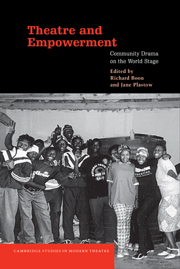Book contents
- Frontmatter
- Contents
- Notes on contributors
- 1 Introduction
- 2 The Wedding Community Play Project: a cross-community production in Northern Ireland
- 3 The Poor Theatre of Monticchiello, Italy
- 4 ‘What happened to you today that reminded you that you are a black man?’ The process of exploring black masculinities in performance, Great Britain
- 5 Wielding the cultural weapon after apartheid: Bongani Linda's Victory Sonqoba Theatre Company, South Africa
- 6 Dance and transformation: the Adugna Community Dance Theatre, Ethiopia
- 7 The Day of Mourning/Pilgrim Progress in Plymouth, USA. Contesting processions: a report on performance, personification and empowerment
- 8 South Asia's Child Rights Theatre for Development: the empowerment of children who are marginalised, disadvantaged and excluded
- 9 Theatre – a space for empowerment: celebrating Jana Sanskriti's experience in India
- Index
7 - The Day of Mourning/Pilgrim Progress in Plymouth, USA. Contesting processions: a report on performance, personification and empowerment
Published online by Cambridge University Press: 22 September 2009
- Frontmatter
- Contents
- Notes on contributors
- 1 Introduction
- 2 The Wedding Community Play Project: a cross-community production in Northern Ireland
- 3 The Poor Theatre of Monticchiello, Italy
- 4 ‘What happened to you today that reminded you that you are a black man?’ The process of exploring black masculinities in performance, Great Britain
- 5 Wielding the cultural weapon after apartheid: Bongani Linda's Victory Sonqoba Theatre Company, South Africa
- 6 Dance and transformation: the Adugna Community Dance Theatre, Ethiopia
- 7 The Day of Mourning/Pilgrim Progress in Plymouth, USA. Contesting processions: a report on performance, personification and empowerment
- 8 South Asia's Child Rights Theatre for Development: the empowerment of children who are marginalised, disadvantaged and excluded
- 9 Theatre – a space for empowerment: celebrating Jana Sanskriti's experience in India
- Index
Summary
‘Plimoth Plantation – Where history repeats itself.’
Plymouth Township Website: http.//Pilgrims.net
22 November, 9.55 a.m., EST. Mayflower House, Plymouth Colony, New England: Twenty-nine pilgrims, survivors of their first harsh winter in America, were putting the finishing touches to their Sunday best. Shoe buckles were polished, starched aprons smoothed, muskets cleaned and oiled with puritanical zeal. Despite their festive apparel, the pilgrims’ faces were sombre. Outside some 300 Wampanoags and their allies awaited them. Their chants and drums sounded an aggressive, possibly hostile tattoo. Last-minute assurances were given and received by the whites. They could show no fear. At the hour, the pilgrims cautiously filed into the street. This was the Plymouth Pilgrim Progress Procession, 22 November, 1997.
Over the past thirty-four years in Plymouth, Massachusetts, contending forces have organised and performed contesting processions, grappling over the signification and legitimacy of America's origin myth: Thanksgiving. The contending performers – Mayflower descendants and their followers, and Native Americans from the tribes belonging to the United American Indians of New England (UAINE) and their supporters – have struggled over the meaning of this national holiday, with Native Americans preferring to consider it the National Day of Mourning, memorialising the genocide of American aboriginals by European colonisers.
Later that day in 1997, the two processions inadvertently clashed when a scheduling error put them on the same street at the same time.
- Type
- Chapter
- Information
- Theatre and EmpowermentCommunity Drama on the World Stage, pp. 155 - 187Publisher: Cambridge University PressPrint publication year: 2004



